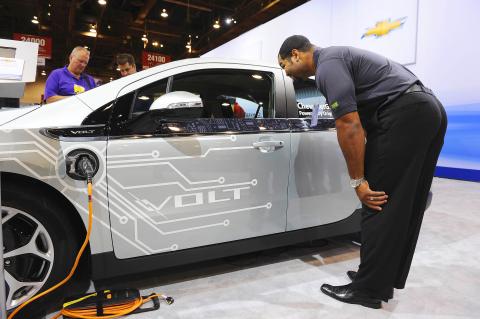Never let it be said that the government of Georgia thinks small.
Among the audacious plans to come out of Tbilisi in recent years: To become the first city with free Wi-Fi throughout (has not happened). To replace all Russian-language college textbooks with equivalents in English (efforts well under way). To expunge the hulking legacy of Soviet architecture (good luck).
In that spirit, this week Georgia announced plans to replace its entire fleet of state-owned cars with electric or hybrid vehicles within four years. Georgia is the first country to make this commitment, said Vera Kobalia, whose ministry — formerly the Ministry of the Economy — has been renamed the Ministry of the Economy and Sustainable Development.

PHOTO: AFP
Kobalia said Georgia — which has a rich supply of cheap hydroelectric power from dams in the Caucasus Mountains — could act as a global laboratory for the use of electric cars.
“We can see how the program will work in Georgia, on a smaller scale, and we hope that other countries will catch up,” she said.
Mikheil Saakashvili, the New York-educated lawyer turned president, has a predilection for bold initiatives. His government is also flush with foreign aid, having received commitments of US$4.55 billion after the 2008 war with Russia; the US$1 billion pledged by the US at the time made Georgia one of the largest recipients of US aid, after Israel, Egypt and Iraq.
Georgia is in talks with several companies, including General Motors, about the purchase of about 4,000 vehicles. Trucks and larger cars, including those in the presidential motorcade, will be exempted, since the electric vehicles available today are inadequately powered or armored, Kobalia said.
As part of the sale, manufacturers will be asked to build service and recharging stations, easing the way for ordinary Georgians to switch to electric cars.
“We want to be a steppingstone for the rest of the population,” she said.
Based on US retail prices, and not including the US federal income tax rebate, 4,000 Chevy Volt sedans would cost Georgia about US$164 million, while the same number of Nissan Leafs or Toyota Priuses would cost US$128 million and US$88 million, respectively.
Since becoming president in 2004, Saakashvili has vigorously cultivated ties with the US and sought to reduce dependency on Russia. The Georgian Army has committed troops to Iraq and Afghanistan and switched from Kalashnikovs to US-made M4 rifles.
General Motors, a majority of which is still owned by the US government, confirmed it is in talks with Tbilisi, but suggested in a statement that its initial production run of Chevy Volts was not focused on Georgia.
“We appreciate their strong interest and will continue the dialogue,” the statement said. “At this time, our primary focus is on a successful US Volt launch.”

SEEKING CLARITY: Washington should not adopt measures that create uncertainties for ‘existing semiconductor investments,’ TSMC said referring to its US$165 billion in the US Taiwan Semiconductor Manufacturing Co (TSMC, 台積電) told the US that any future tariffs on Taiwanese semiconductors could reduce demand for chips and derail its pledge to increase its investment in Arizona. “New import restrictions could jeopardize current US leadership in the competitive technology industry and create uncertainties for many committed semiconductor capital projects in the US, including TSMC Arizona’s significant investment plan in Phoenix,” the chipmaker wrote in a letter to the US Department of Commerce. TSMC issued the warning in response to a solicitation for comments by the department on a possible tariff on semiconductor imports by US President Donald Trump’s

‘FAILED EXPORT CONTROLS’: Jensen Huang said that Washington should maximize the speed of AI diffusion, because not doing so would give competitors an advantage Nvidia Corp cofounder and chief executive officer Jensen Huang (黃仁勳) yesterday criticized the US government’s restrictions on exports of artificial intelligence (AI) chips to China, saying that the policy was a failure and would only spur China to accelerate AI development. The export controls gave China the spirit, motivation and government support to accelerate AI development, Huang told reporters at the Computex trade show in Taipei. The competition in China is already intense, given its strong software capabilities, extensive technology ecosystems and work efficiency, he said. “All in all, the export controls were a failure. The facts would suggest it,” he said. “The US

The government has launched a three-pronged strategy to attract local and international talent, aiming to position Taiwan as a new global hub following Nvidia Corp’s announcement that it has chosen Taipei as the site of its Taiwan headquarters. Nvidia cofounder and CEO Jensen Huang (黃仁勳) on Monday last week announced during his keynote speech at the Computex trade show in Taipei that the Nvidia Constellation, the company’s planned Taiwan headquarters, would be located in the Beitou-Shilin Technology Park (北投士林科技園區) in Taipei. Huang’s decision to establish a base in Taiwan is “primarily due to Taiwan’s talent pool and its strength in the semiconductor

French President Emmanuel Macron has expressed gratitude to Hon Hai Precision Industry Co (鴻海精密) for its plan to invest approximately 250 million euros (US$278 million) in a joint venture in France focused on the semiconductor and space industries. On his official X account on Tuesday, Macron thanked Hon Hai, also known globally as Foxconn Technology Group (富士康科技集團), for its investment projects announced at Choose France, a flagship economic summit held on Monday to attract foreign investment. In the post, Macron included a GIF displaying the national flag of the Republic of China (Taiwan), as he did for other foreign investors, including China-based